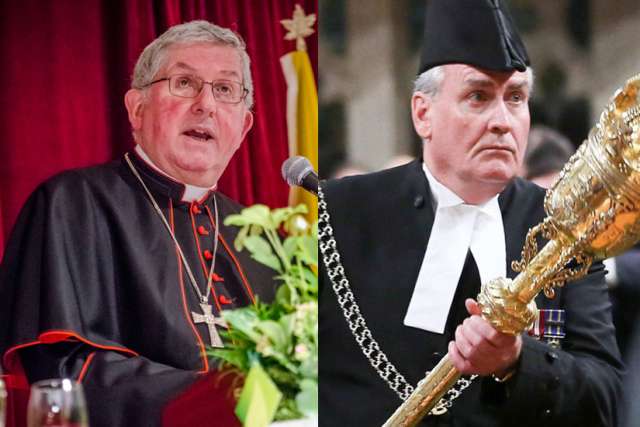The words of Cardinal Thomas Collins and Kevin Vickers, Canada’s Ambassador to Ireland and heroic former Sergeant-at- Arms in the House of Commons, unquestionably moved their immediate audiences. What is devoutly to be prayed is that their messages of wisdom might somehow reach the wider Catholic world to help calm its current anger.
Even as someone who has spent a professional lifetime shooting his mouth off, I am increasingly disquieted by the verbiage verging on the violent that is arising within and around our Holy Mother the Church. Though such talk has been escalating for years, in the wake of the Synod on the Family we’ve been afflicted by martial metaphors so extreme as to warn of “civil war” erupting.
On its face, such language is absurd, of course. No modern day Giordano will be burned in Rome’s Campo de’ Fiori for taking the wrong position on opening communion to the divorced.
Recognizing absurdity is not a ground, however, for denying its potential to cause serious harm. Winston Churchill famously said that jaw-jaw is infinitely preferable to war-war. But when jawing becomes bellicosity rampant with images of physical aggression, should we not be asking whether winning the argument might come at the cost of losing our souls?
Certainly, that was the caution at the heart of the remarkable talk Vickers gave at the launch of the Faith in Canada 150 initiative on Nov. 5. The project, which will make celebration of faith a vital part of Canada’s 2017 birthday party, brought together representatives of several faith traditions at the CBC headquarters.
Vickers spoke as a Catholic whose life has been informed by faith since childhood. He also spoke as the hero, though he detests the label, who shot and killed a terrorist in Parliament a year ago. And he spoke as a veteran RCMP officer who obtained the confessions of 17 accused murderers by, he said, approaching each with the dignity due a child of God.
His most compelling vignette, for me, concerned his part in returning peace to the New Brunswick community of Burnt Church when violence erupted between Acadian and aboriginal fishermen. He described sitting in a police car with a group of native warriors who were infuriated and ideologically intent on going beyond jaw-jaw to war-war.
“Finally, I don’t know why, I just said ‘okay, let’s pray.’ And I started to say the rosary. They immediately became very quiet and respectful.”
Order might not have been instantly restored, but the peace that passes all understanding was returned. Praying with would-be warriors renewed Vickers’ conviction that even the threat of force must be an absolute last resort, and never a substitute for healing through God’s love.
As Vickers spoke, Cardinal Collins was delivering a notably similar message at the annual Cardinal’s Dinner. A key theme was what he called the “lurking evil” of euthanasia that will be a deadly reality of Canadian life in a matter of weeks. He did not whitewash the dark stain of the Supreme Court decision legalizing medical killing. He was blunt about the moral horror of doctors having to end lives to satiate the culture of death. At the same time, he used the moment to teach again that the response of Catholics must never be an angry turning away into isolation and bellicosity. Instead, he said, it must be a turning toward the growth of effective and readily available palliative care, not merely as an alternative for euthanasia, but as a sign of who and what we are.
“This is where our efforts should be focused — fostering a culture of love and care for those who are dying. Amid the challenges of this world, we are all called, individually and as a community of faith, to be a sign of hope.”
What is true for the challenges of the world is true for the challenges of the Church. We who use the language of men will inevitably abuse the language of men. We will sometimes jaw-jaw too far. When we do, let us listen to the wisdom of those who remind us that love and hope are our Holy Mother’s heart.
(Stockland is publisher of Convium magazine and a senior fellow with Cardus.)


